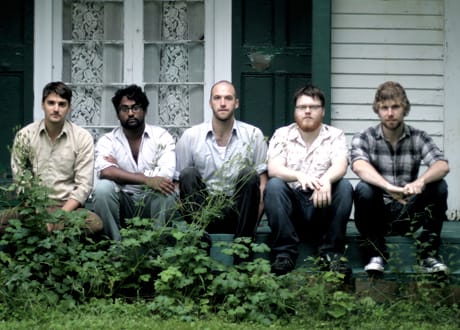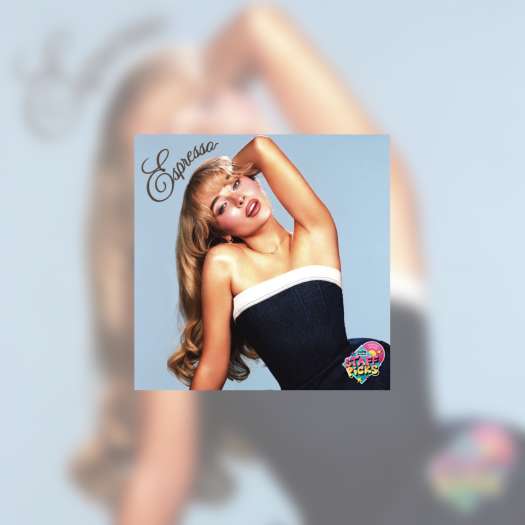In recent years, life has been a series of highlights for Newfoundland six-piece Hey Rosetta! Their sophomore album, 2008's Into Your Lungs, earned a shortlist nomination from the prestigious Polaris Music Prize, and this helped to propel the group to a series of high profile tours that have taken them from China to Australia to the Arctic. These trips helped to inspire the group's latest LP, Seeds, which began to take shape during a 2009 visit to northern Canada.
"We went up and did a tour in Nunavut and the Northwest Territories and played six or seven shows," explains frontman Tim Baker from his home in St. John's. "We got to go sit with the Elders and eat whale blubber."
What struck the songwriter most of all, however, was the weather in the Nunavut capital, Iqaluit. "It was snowing in September," he recalls. "I couldn't help but think how powerful the spring must be there, after nine or ten months of winter. There's no better metaphor for a really empowering rebirth and a hopeful time."
The extreme Nunavut climate remained at the forefront of the songwriter's mind long after he had left the northern territory. "I think about living here in St. John's, and how cold and miserable it can be long into June," he reflects. "I just imagine it must be like that ― but heightened."
As he set about penning new material, he filled his notebooks with lyrics about springtime and renewal. Seasonal imagery pervades the 11 songs on Seeds, which are littered with emotional awakenings and romantic reunions. "There was definitely a preoccupation with the idea of rebirth, and of being saved or fixed and starting again," he confirms.
These themes feature prominently on the acoustic lament "Bandages," as Baker sings, "That half of the bed / Empty like a page," before ultimately concluding "Come, she will." The crunchy "Young Glass" is similarly impassioned, as the frontman repeats, "Even though I thought I was all alone, I was wrong." This optimistic message is mirrored by the musical accompaniment, as the band bring the song to a thundering, string-laden crescendo.
Seeds is filled with such climaxes, and the record is sure to please fans of the group's dramatic baroque rock sound. Nearly every song has a massive emotional range, as solemn ballads transform into sweeping rockers before giving way to sudden comedowns. It's an emotional roller coaster that has become the group's signature sound.
"We're trying not to do everything in every song, and go every possible place and have them epic as all hell," reveals Baker. "But still, we just can't deny ourselves the builds and the breakdowns and the dynamics that I think have been part of what we do from the very beginning."
Sure enough, the outfit's latest work is perhaps their most grandiose yet. This is largely thanks to the lush arrangements, which brim with cinematic strings and ornate instrumental touches. Baker originally hoped to hire an orchestra to achieve this full-bodied sound, but concedes, "We didn't really have the budget or the time to do that."
Instead, Hey Rosetta! and producer Tony Dougan (Belle and Sebastian, Mogwai, Wintersleep) recruited a number of musical allies to help make their vision a reality. "We ended up making some really big orchestra-like sounds out of a couple of different quartets playing together over and over, and a bunch of our friends playing horns and woodwinds," says Baker. "So we sort of cobbled together an orchestra."
Despite being recorded at the same studio as Into Your Lungs (the Sonic Temple in Halifax), the band's resourcefulness means that Seeds boasts a beefier, more varied sound than its predecessor. Lead single "Yer Spring" begins with quietly shimmering guitars before giving way to fist-pumping rock-outs and a syncopated, Afro-pop-inflected bridge. "New Sum" is a surprising foray into reggae, as its ambient intro is suddenly replaced by a strutting bass line and a skanking keyboard.
Seeds even contains a tribute to the band's northern Canadian adventure in the form of Inuit throat singers, who lend their otherworldly gasps to the final moments of "Parson Brown." "Throat singers are just so fucking wicked and freaky sounding," Baker marvels. "I love the way it sounds. It's this bewildering thing."
He goes on to explain that the throat singing was recorded in the basement of his own house. "Inuit throat singers, as far as I know, are always two girls," he says. "They hold elbows and their faces are a couple inches apart, really close. And they just look into each other's eyes and make these crazy sounds and it goes until they laugh. It's almost like a staring contest."
The album's intricate arrangements were achieved after months or hard work, as the musicians agonized over each detail, repeatedly constructing and deconstructing each track until it finally met their expectations. "You work for a couple years on some songs and it only ends up being ten or 11 songs," the frontman says. Of the title track, he confesses, "We really had trouble making it work. We tried that song hundreds of different fucking ways."
Now that the album is finally done, Hey Rosetta! are getting set to resume their rigorous touring schedule. Despite the exotic locales that the band may soon visit, Baker is most looking forward to hitting the road in America. "Growing up in Newfoundland," he says, "the United States is TV land. It's the setting for movies. When you're there, it's real, and people are friendly and sensible, and there are no crimes being committed. You don't see any crazy, racist, gun-toting people."
Enthusiastic as he is, Baker also admits that the group's continent-hopping ways can be emotionally draining. It isn't surprising that he feels this way ― after all, this is the same man whose travels inspired him to write an album about the need for rebirth. Speaking about the gruelling drives and the loneliness of life in a tour van, Baker returns to his favourite metaphor: spring. "The crowds tend to help you out," he says. "I think that can be your spring, so to speak."
"We went up and did a tour in Nunavut and the Northwest Territories and played six or seven shows," explains frontman Tim Baker from his home in St. John's. "We got to go sit with the Elders and eat whale blubber."
What struck the songwriter most of all, however, was the weather in the Nunavut capital, Iqaluit. "It was snowing in September," he recalls. "I couldn't help but think how powerful the spring must be there, after nine or ten months of winter. There's no better metaphor for a really empowering rebirth and a hopeful time."
The extreme Nunavut climate remained at the forefront of the songwriter's mind long after he had left the northern territory. "I think about living here in St. John's, and how cold and miserable it can be long into June," he reflects. "I just imagine it must be like that ― but heightened."
As he set about penning new material, he filled his notebooks with lyrics about springtime and renewal. Seasonal imagery pervades the 11 songs on Seeds, which are littered with emotional awakenings and romantic reunions. "There was definitely a preoccupation with the idea of rebirth, and of being saved or fixed and starting again," he confirms.
These themes feature prominently on the acoustic lament "Bandages," as Baker sings, "That half of the bed / Empty like a page," before ultimately concluding "Come, she will." The crunchy "Young Glass" is similarly impassioned, as the frontman repeats, "Even though I thought I was all alone, I was wrong." This optimistic message is mirrored by the musical accompaniment, as the band bring the song to a thundering, string-laden crescendo.
Seeds is filled with such climaxes, and the record is sure to please fans of the group's dramatic baroque rock sound. Nearly every song has a massive emotional range, as solemn ballads transform into sweeping rockers before giving way to sudden comedowns. It's an emotional roller coaster that has become the group's signature sound.
"We're trying not to do everything in every song, and go every possible place and have them epic as all hell," reveals Baker. "But still, we just can't deny ourselves the builds and the breakdowns and the dynamics that I think have been part of what we do from the very beginning."
Sure enough, the outfit's latest work is perhaps their most grandiose yet. This is largely thanks to the lush arrangements, which brim with cinematic strings and ornate instrumental touches. Baker originally hoped to hire an orchestra to achieve this full-bodied sound, but concedes, "We didn't really have the budget or the time to do that."
Instead, Hey Rosetta! and producer Tony Dougan (Belle and Sebastian, Mogwai, Wintersleep) recruited a number of musical allies to help make their vision a reality. "We ended up making some really big orchestra-like sounds out of a couple of different quartets playing together over and over, and a bunch of our friends playing horns and woodwinds," says Baker. "So we sort of cobbled together an orchestra."
Despite being recorded at the same studio as Into Your Lungs (the Sonic Temple in Halifax), the band's resourcefulness means that Seeds boasts a beefier, more varied sound than its predecessor. Lead single "Yer Spring" begins with quietly shimmering guitars before giving way to fist-pumping rock-outs and a syncopated, Afro-pop-inflected bridge. "New Sum" is a surprising foray into reggae, as its ambient intro is suddenly replaced by a strutting bass line and a skanking keyboard.
Seeds even contains a tribute to the band's northern Canadian adventure in the form of Inuit throat singers, who lend their otherworldly gasps to the final moments of "Parson Brown." "Throat singers are just so fucking wicked and freaky sounding," Baker marvels. "I love the way it sounds. It's this bewildering thing."
He goes on to explain that the throat singing was recorded in the basement of his own house. "Inuit throat singers, as far as I know, are always two girls," he says. "They hold elbows and their faces are a couple inches apart, really close. And they just look into each other's eyes and make these crazy sounds and it goes until they laugh. It's almost like a staring contest."
The album's intricate arrangements were achieved after months or hard work, as the musicians agonized over each detail, repeatedly constructing and deconstructing each track until it finally met their expectations. "You work for a couple years on some songs and it only ends up being ten or 11 songs," the frontman says. Of the title track, he confesses, "We really had trouble making it work. We tried that song hundreds of different fucking ways."
Now that the album is finally done, Hey Rosetta! are getting set to resume their rigorous touring schedule. Despite the exotic locales that the band may soon visit, Baker is most looking forward to hitting the road in America. "Growing up in Newfoundland," he says, "the United States is TV land. It's the setting for movies. When you're there, it's real, and people are friendly and sensible, and there are no crimes being committed. You don't see any crazy, racist, gun-toting people."
Enthusiastic as he is, Baker also admits that the group's continent-hopping ways can be emotionally draining. It isn't surprising that he feels this way ― after all, this is the same man whose travels inspired him to write an album about the need for rebirth. Speaking about the gruelling drives and the loneliness of life in a tour van, Baker returns to his favourite metaphor: spring. "The crowds tend to help you out," he says. "I think that can be your spring, so to speak."




